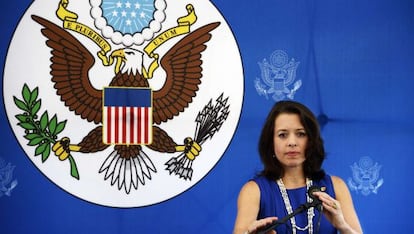US retaliates for diplomat expulsions by kicking out three Venezuelans
Maduro claims embassy officials were plotting to wreak havoc on state-run industries

The United States on Tuesday kicked out three Venezuelan diplomats, including the commercial attache at the Washington embassy, in retaliation for President Nicolás Maduro’s expulsions of three of its envoys from Caracas.
The day before, Maduro ordered three US Embassy officials, including the charge d’affaires, to leave the country by Wednesday after he accused them of trying to destabilize state-owned industries. “Get out of Venezuela,” he said on state-run television Monday night. “Yankee go home; enough with the abuses.”
The diplomats were identified as charge d’affaires Kelly Keiderling, assistant secretary for political affairs Elizabeth Hoffman and deputy consul David Mutt.
At a news conference in Caracas, Keiderling said that “all accusations of sabotage are false.”
Maduro said that he would “assume all responsibility” for these latest expulsions and ordered the diplomats to leave the country within 48 hours.
“They were there conducting normal diplomatic engagement, as we’ve said in the past, and that should come as no surprise”
“We completely reject the Venezuelan government’s allegations of US government involvement in any type of conspiracy to destabilize the Venezuelan government,” said State Department spokeswoman Jen Psaki on Tuesday.
In return, the US government expelled commercial attache Calixto Ortega and second secretary at the Venezuelan Embassy in Washington, Mónica Alejandra Sánchez Morales, as well as Venezuela’s consul in Houston, Marisol Gutiérrez de Almeida, declaring them “personae non gratae.”
According to the Venezuelan leader, the three US diplomats were involved in financing opposition groups to sabotage state-owned industries in southern Bolívar state, where the bulk of public corporations operate. Among them is giant steelmaker Sidor, where workers went back on strike on Tuesday after they agreed to end a 10-day work stoppage this weekend. Their union announced it had reached an agreement over benefits owed to them from several years back.
Maduro said that the strike coincided with a visit the three recently made to Bolívar state, where he said that they were recorded by security officials meeting with opposition leaders.
“They were there conducting normal diplomatic engagement, as we’ve said in the past, and that should come as no surprise. We, of course, maintain regular contacts across the Venezuelan political spectrum, and we maintain a broad perspective on Venezuela and travel frequently,” Psaki said.
There is growing speculation of unease in the Venezuelan military
Opposition leader Henrique Capriles wrote on his Twitter account that Maduro’s allegations were “just smoke to cover up the fact that they can’t manage the country.” Capriles has been challenging the results of the April presidential election after narrowly losing to Maduro.
Nevertheless, this latest move by Maduro has only fueled tensions across a nation that is being bombarded with rumors and accusations coming from different sectors. Besides the severe food shortages and falling government revenues, there is growing speculation that there is unease in the military. The rumors reportedly stem from recent decisions taken by the Maduro government to decline to complain about the granting of an oil concession by neighboring Guyana in the disputed Essequibo region. Georgetown controls the strip of land on Venezuela’s eastern border but Caracas has claimed the area for two centuries.
Last week, Maduro canceled his plans to travel to New York to attend the UN General Assembly because he said there were plots to physically harm him there.
Tu suscripción se está usando en otro dispositivo
¿Quieres añadir otro usuario a tu suscripción?
Si continúas leyendo en este dispositivo, no se podrá leer en el otro.
FlechaTu suscripción se está usando en otro dispositivo y solo puedes acceder a EL PAÍS desde un dispositivo a la vez.
Si quieres compartir tu cuenta, cambia tu suscripción a la modalidad Premium, así podrás añadir otro usuario. Cada uno accederá con su propia cuenta de email, lo que os permitirá personalizar vuestra experiencia en EL PAÍS.
¿Tienes una suscripción de empresa? Accede aquí para contratar más cuentas.
En el caso de no saber quién está usando tu cuenta, te recomendamos cambiar tu contraseña aquí.
Si decides continuar compartiendo tu cuenta, este mensaje se mostrará en tu dispositivo y en el de la otra persona que está usando tu cuenta de forma indefinida, afectando a tu experiencia de lectura. Puedes consultar aquí los términos y condiciones de la suscripción digital.








































